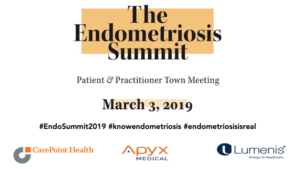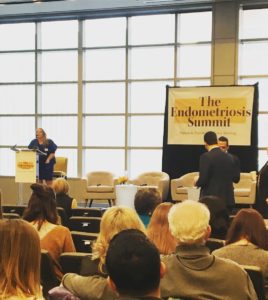By Sallie Sarrel, PT, ATC, DPT
On March 3, 2019, over 350 patients, specialists, activists, and industry leaders collaborated in person at the first-ever Endometriosis Summit, a patient and practitioner town hall meeting that demanded understanding of the disease, addressed state-of-the-art therapies, and raised future directions in its treatment. Another 20,000-plus viewers watched and participated live on Lumenis GYN Facebook. Through Nancy’s Nook, another highly revered endometriosis education Facebook group, over 5,000 people participated in moderated live discussions. Many more continue to watch the archived sessions online. Summit cofounder and organizer Dr. Andrea Vidali and I are now evaluating the results and planning for future sessions. This model is showing promise for other ambitious educational needs in healthcare.
Facing a Tough Challenge Together
Endometriosis shares some common traits with medicine’s toughest educational challenges. Although the condition is common, affecting at least 1 in 10 women of reproductive age1, it remains under-recognized and under-diagnosed. As a person with endometriosis, I find that many patients’ stories of diagnosis are similar to my own. They include years of misdiagnosis, infertility, gaslighting, and needless suffering. In addition, the educational challenge is not limited to patients and gynecologists – early diagnosis and effective treatment won’t become the norm until general practitioners and surgical consults recognize the signs and symptoms, acquiesce when their required skill is insufficient, and make meaningful referrals.
Because it will require a collaborative effort to elevate endometriosis care, it makes sense to approach education collaboratively. As the Endometriosis Summit organizers, Dr. Vidali and I knew we needed to bring together voices from across the endometriosis world. We selected partners that have supported neutral education with the patients’ best interests in mind.
Lumenis signed on to sponsor the Endometriosis Summit early. Lumenis manufactures the laser used in “gold standard” endometriosis surgery. The company’s commitment to developing CO2 laser technology that epitomizes both minimally invasive and decreased morbidity outcomes for endometriosis, as well as its dedication to supporting and educating women with the disease, made for a perfect match. CarePoint Health, the hospital system in our host region of northern New Jersey, supported our desire to raise awareness of endometriosis and decrease the diagnostic delay that many women experience. Nonprofit partnerships were made with EndoWhat?, Endo Invisible, and the Endometriosis Research Center to help connect the summit to large patient and physician audiences. In future Endometriosis Summits, we are looking to partner with surgical and medical societies such as AAGL, IPPS, and SLS.
Making a Real Difference
The Society of Laparoendoscopic Surgeons excels in teaching differential diagnosis of pelvic pain across gynecologists, general surgeons, urologists, and other specialties. Their annual MIS Week Meeting typically features a course in pelvic pain differential diagnosis, and this year’s meeting in New Orleans in September will feature a pre-meeting course in pelvic pain and differentials in pelvic pain. If we can continue this level of collaborative education for endometriosis, we can change the national standard of care for the disease, and women will routinely get the help they need, rather than years of pain and misdiagnosis.
The gold standard for endometriosis treatment is laparoscopic laser excision surgery followed by multidisciplinary care that covers the bladder, bowel, pelvic floor, other organs, and neuropathy, as well as related etiologies. Today, most patients do not get gold-standard treatment, but plans are underway for a 2-day Endometriosis Summit next year, with more attendees and an even wider online reach, with the goal of making treatment plans accessible. Our partners continue to support our efforts; we will keep moving forward until and beyond there is a permanent change in endometriosis care.
1. Rogers PA, et al. Priorities for endometriosis research: recommendations from an international consensus workshop. Reprod Sci 2009;16(4):335-46.
Sallie Sarrel, PT, ATC, DPT, is a pelvic health physical therapist specializing in management of endometriosis and chronic pelvic pain, practicing in New York and New Jersey. After a long and difficult battle with endometriosis, she cofounded the Endometriosis Summit, hoping to make endometriosis education and care accessible to all. She has authored many articles on endometriosis pain and is a frequent conference speaker. Dr. Sallie can be found at www.salliesarrel.com, on Facebook as Sallie Sarrel, Physical Therapist, and on Instagram @drsalliept.

Follow the Endometriosis Summit on both Facebook and Instagram.
The content presented on this page is provided for informational and/or educational purposes. This material represents the views and opinions of its authors and should not be construed as representing or reflecting the official position, views or opinions of the Society of Laparoendoscopic Surgeons. The authors of the work are solely responsible for its content.





